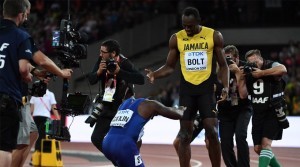One final time, Usain Bolt peered down the last 50 meters of his lane and saw sprinter upon sprinter running footsteps ahead of him.
One final time, the world-record holder furiously pumped the arms and legs on his gangly 6-foot-5 frame, desperately trying to reel in all those would-be winners as the finish line fast approached.
This time, the afterburners kicked in but not hard enough. Not one, but two overlooked and underappreciated Americans — Justin Gatlin and Christian Coleman — held off what was once Bolt’s undeniable late charge.
This time, Bolt finished third in the 100-meter dash at world championships. That’s right: A bronze-medal finish Saturday night in the going-away party for one of the planet’s most entertaining icons and track and field’s lone shining star.
“No regrets,” Bolt insisted, long after a result that stunned a pumped-up crowd into near silence. “It was always going to end, no matter what happened — win, lose or draw. It doesn’t change anything in my career.”
Gatlin, who actually trailed Bolt at the halfway point, heard boos cascade loudly across the stadium when his winning time, 9.92 seconds, popped up on the scoreboard. The 35-year-old, who has served two doping bans and been widely cast as a villain to Bolt’s hero, went sprawling to the ground with a huge smile. Later, he bowed down to the man he finally defeated.
“I wanted to pay homage to him,” Gatlin said. “This night is still a magical night for track and field and Usain Bolt. I’m just happy to be one of his biggest competitors.”
Coleman, a 21-year-old in the first major race of his life, was in shock, too: “To beat someone I looked up to when I was growing up. I was just happy to be on the line with him,” he conceded.
Bolt, who finished third in a time of 9.95, accepted with class both the result, and the fact that, at 30, he probably is picking the perfect time to retire.
“I did it for the fans,” he said after collecting a bronze to go with his three world golds at 100 meters. “They wanted me to go for one more season. I came out and did the best I could.”
In the past, the scene after a Bolt race was really just an after-party masquerading as ceremony, filled with Bob Marley tunes, Jamaican flags and dancing. On Saturday, it felt surreal to anyone who’s been at one of these Bolt victories before.
With house music playing softly throughout the stadium where Bolt won the middle three of his nine Olympic finals, Gatlin and Coleman passed through the exit tunnel while the former champion took a 10-minute trip around the track, then detoured into the stands for selfies with the Jamaican fans who came across the ocean to see him one last time.
A few minutes after that, he stepped onto the track, kneeled down and kissed the finish line that he crossed in Lane 4.
Then, he gave the fans what they expect: The famous “To The World” pose, which used to be the cherry on top of a raucous, fun-filled night. But where in the past the stadium would have still been brimming, this time, it was about one-eighth full and emptying quickly.
Bolt still has the 4×100 relay next weekend. He was asked if he wished he’d run what is widely considered his best race — the 200, where he also holds the world record.
“It probably would’ve been even worse,” Bolt said. “I’m not in shape to run 200 meters right now.”
Should we have seen this coming? Maybe so.
Bolt raced very lightly this year, and his best time coming into the meet was the same 9.95 seconds he ran in his finale.
His first heat, on Friday night, was ugly. Though he won, he lumbered out of the start and complained about the feel of the starting blocks.
In the semifinals, he actually lost by .01 to Coleman — a rare defeat in any sort of race, but one that could still be chalked up to it being a tune-up, with the real race more than two hours away.
But in the back of his mind, reality was setting in: “After the semifinal, I knew if I didn’t get my start, I was going to be in trouble,” he said. “I knew it. And when I left the blocks, I was like ‘Aaaah.'”
He was the second-slowest starter in the eight-man field. Nothing new there, though his ability to overcome it and the fitness of the guys he was reeling in turned the usual comeback into something nobody’s seen before on this big a stage.
Through most of the race, it looked as if Bolt would be trying to reel in Coleman, the NCAA champion, who was in Lane 5, and racing in his first major competition after a long college season.
Barely in the picture, outside in Lane 8, was Gatlin, who was actually trailing Bolt by a step early-on.
Two years ago at world championships, Gatlin had Bolt all but beaten in the 100 finals, but he leaned too early before the line and let the champion pass him for a .01-second victory.
This time, it was Gatlin doing the passing, and now he is a world champion in addition to a trivia question: Who was the last sprinter to win Olympic gold in the 100 before Bolt? It was Gatlin in 2004.
“You guys call it losses, losses, losses,” Gatlin said. “I’ll call it lessons, lessons, lessons.”
The new champion spent much of his post-race news conference insisting he didn’t mind the booing and explaining that he’s not that bad a guy.
“I know you have to have the black hat and the white hat, but guys, c’mon,” he said.
Bolt, meanwhile, was insistent that neither Gatlin’s win nor his own loss was a disaster for track. He called the evening and the crowd “beautiful” — even if that medal he earned might not seem as pretty as the rest.
“It doesn’t change anything,” Bolt said. “I lost the race to a great competitor. I came out here and did my best. I’ve done all I can do for my sport and for myself.”
Ask me anything
Explore related questions





